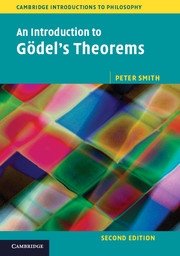Book contents
- Frontmatter
- Contents
- Preface
- Thanks
- 1 What Gödel's Theorems say
- 2 Functions and enumerations
- 3 Effective computability
- 4 Effectively axiomatized theories
- 5 Capturing numerical properties
- 6 The truths of arithmetic
- 7 Sufficiently strong arithmetics
- 8 Interlude: Taking stock
- 9 Induction
- 10 Two formalized arithmetics
- 11 What Q can prove
- 12 IΔ0, an arithmetic with induction
- 13 First-order Peano Arithmetic
- 14 Primitive recursive functions
- 15 LA can express every p.r. function
- 16 Capturing functions
- 17 Q is p.r. adequate
- 18 Interlude: A very little about Principia
- 19 The arithmetization of syntax
- 20 Arithmetization in more detail
- 21 PA is incomplete
- 22 Gödel's First Theorem
- 23 Interlude: About the First Theorem
- 24 The Diagonalization Lemma
- 25 Rosser's proof
- 26 Broadening the scope
- 27 Tarski's Theorem
- 28 Speed-up
- 29 Second-order arithmetics
- 30 Interlude: Incompleteness and Isaacson's Thesis
- 31 Gödel's Second Theorem for PA
- 32 On the ‘unprovability of consistency’
- 33 Generalizing the Second Theorem
- 34 Löb's Theorem and other matters
- 35 Deriving the derivability conditions
- 36 ‘The best and most general version’
- 37 Interlude: The Second Theorem, Hilbert, minds and machines
- 38 μ-Recursive functions
- 39 Q is recursively adequate
- 40 Undecidability and incompleteness
- 41 Turing machines
- 42 Turing machines and recursiveness
- 43 Halting and incompleteness
- 44 The Church–Turing Thesis
- 45 Proving the Thesis?
- 46 Looking back
- Further reading
- Bibliography
- Index
Preface
- Frontmatter
- Contents
- Preface
- Thanks
- 1 What Gödel's Theorems say
- 2 Functions and enumerations
- 3 Effective computability
- 4 Effectively axiomatized theories
- 5 Capturing numerical properties
- 6 The truths of arithmetic
- 7 Sufficiently strong arithmetics
- 8 Interlude: Taking stock
- 9 Induction
- 10 Two formalized arithmetics
- 11 What Q can prove
- 12 IΔ0, an arithmetic with induction
- 13 First-order Peano Arithmetic
- 14 Primitive recursive functions
- 15 LA can express every p.r. function
- 16 Capturing functions
- 17 Q is p.r. adequate
- 18 Interlude: A very little about Principia
- 19 The arithmetization of syntax
- 20 Arithmetization in more detail
- 21 PA is incomplete
- 22 Gödel's First Theorem
- 23 Interlude: About the First Theorem
- 24 The Diagonalization Lemma
- 25 Rosser's proof
- 26 Broadening the scope
- 27 Tarski's Theorem
- 28 Speed-up
- 29 Second-order arithmetics
- 30 Interlude: Incompleteness and Isaacson's Thesis
- 31 Gödel's Second Theorem for PA
- 32 On the ‘unprovability of consistency’
- 33 Generalizing the Second Theorem
- 34 Löb's Theorem and other matters
- 35 Deriving the derivability conditions
- 36 ‘The best and most general version’
- 37 Interlude: The Second Theorem, Hilbert, minds and machines
- 38 μ-Recursive functions
- 39 Q is recursively adequate
- 40 Undecidability and incompleteness
- 41 Turing machines
- 42 Turing machines and recursiveness
- 43 Halting and incompleteness
- 44 The Church–Turing Thesis
- 45 Proving the Thesis?
- 46 Looking back
- Further reading
- Bibliography
- Index
Summary
In 1931, the young Kurt Gödel published his First and Second Incompleteness Theorems; very often, these are referred to simply as ‘Gödel's Theorems’ (even though he proved many other important results). These Incompleteness Theorems settled – or at least, seemed to settle – some of the crucial questions of the day concerning the foundations of mathematics. They remain of the greatest significance for the philosophy of mathematics, though just what that significance is continues to be debated. It has also frequently been claimed that Gödel's Theorems have a much wider impact on very general issues about language, truth and the mind.
This book gives proofs of the Theorems and related formal results, and touches – necessarily briefly – on some of their implications. Who is the book for? Roughly speaking, for those who want a lot more fine detail than you get in books for a general audience (the best of those is Franzen, 2005), but who find the rather forbidding presentations in classic texts in mathematical logic (like Mendelson, 1997) too short on explanatory scene-setting. I assume only a modest amount of background in logic. So I hope philosophy students will find the book useful, as will mathematicians who want a more accessible exposition. But don't be misled by the relatively relaxed style; don't try to browse through too quickly. We do cover a lot of ground in quite a bit of detail, and new ideas often come thick and fast. Take things slowly!
- Type
- Chapter
- Information
- An Introduction to Gödel's Theorems , pp. xiii - xivPublisher: Cambridge University PressPrint publication year: 2013

